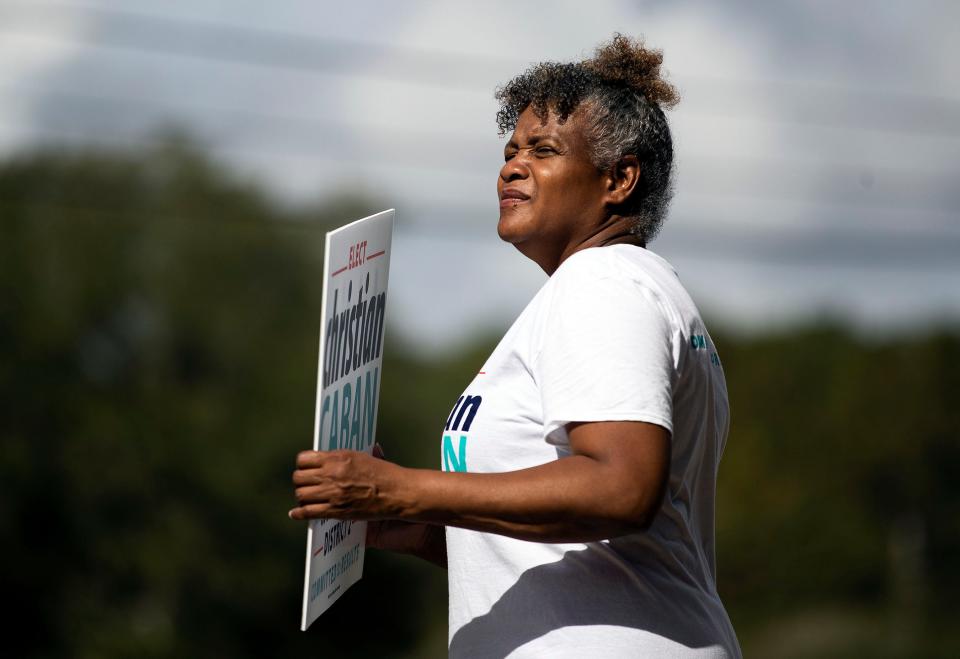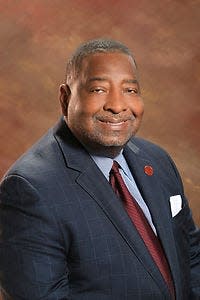Judicial consolidation in Florida: A threat to justice and voter representation
- Oops!Something went wrong.Please try again later.
Florida's judicial landscape is facing a significant transformation — one that threatens the very principles of justice, voter representation, and equitable access to our legal system. Judicial consolidation, currently pushed by Gov. Ron DeSantis and Republicans in the Florida Legislature may sound innocuous, but it carries profound implications for our state's residents, particularly those of color who have historically sought justice through the courts.

As a retired judge from Volusia County, I have seen the importance of ensuring that our judicial system remains fair, accessible, and representative of the communities it serves. But the proposed judicial consolidation threatens to undermine these principles, resulting in far-reaching consequences for our state.
First and foremost, it's crucial to understand the implications of consolidating judicial circuits in Florida. While proponents argue that it may streamline the system and save costs, the reality is far more complex. Such consolidation could potentially harm our communities by limiting access to justice, increasing costs, and forcing residents to travel long distances for simple legal matters.
Consider, for a moment, the impact on ordinary citizens who rely on their local courts for matters like traffic violations, family disputes, or small claims. Under the consolidation plan, some Floridians may have to travel long distances, facing not only increased time and expense but also potential hardships related to transportation and scheduling. This is particularly concerning for marginalized communities who may already struggle with these burdens.
Furthermore, consolidation could result in fewer local courthouses, which can have a detrimental effect on our communities. These courthouses are not just centers of justice; they are also hubs of community engagement and resources. Fewer courthouses mean fewer opportunities for citizens to access legal assistance, mediation services, and other vital community resources.
The implications extend beyond inconvenience and financial burdens. The consolidation plan could significantly impact the ability of voters, especially Black voters, to have a voice in the election of state attorneys and judges who represent them. Ensuring diversity and empathy within our judicial system is paramount. Historically, our courts have been a vital check against laws and policies that harm communities of color.

For example, consider the critical roles played by State Attorneys Andrew Warren and Monique Worrell, who have demonstrated an understanding of the systemic forces at play within our criminal justice system. Their leadership exemplifies the need for prosecutors who approach their roles with empathy and an unwavering commitment to justice. Yet, they were removed by Gov. DeSantis to consolidate power. Furthermore, this consolidation threatens to dilute the voting power of communities of color, effectively limiting their ability to elect representatives who share their concerns and values.

Black voters, like all voters, should have a voice in shaping the judicial process. Our courts, despite their checkered history, have often served as a beacon of hope by intervening in cases where laws and policies disproportionately impact people of color. To gerrymander judicial circuits in a way that diminishes the voting power of people of color is a direct attack on our voting rights.
We must recognize the broader context of these actions. Across the nation, we have witnessed efforts to erode the fundamental principles of justice, equity, and representation. Florida should not become another battleground in this struggle. We must stand united against these attempts to weaken our democratic institutions.
Gov. DeSantis and Republicans in the Florida Legislature must reconsider their support for judicial consolidation. Instead, they should prioritize equitable access to justice, the preservation of community resources, and the voices of all citizens in our judicial system. It's time for our leaders to recognize that justice is not a commodity to be streamlined or consolidated; it's a sacred duty to protect the rights and interests of all Floridians.
In the end, the fate of judicial consolidation in Florida rests in the hands of our elected officials. We must hold them accountable for safeguarding our democratic values, ensuring equal access to justice, and respecting the rights of all voters, especially those who have been historically marginalized. Our democracy depends on it, and so does the integrity of our judicial system.

Hubert Grimes is a retired Volusia Circuit Judge who also served as President of the 190 member Florida Conference of County Court Judges (1996-98) and the 100 member Latimer Hawkins Judicial Council (2001-2014). In addition, he also worked as an adjunct law professor at FAMU College of Law from 2007-14.
JOIN THE CONVERSATION
Send letters to the editor (up to 200 words) or Your Turn columns (about 500 words) to letters@tallahassee.com. Please include your address for verification purposes only, and if you send a Your Turn, also include a photo and 1-2 line bio of yourself. You can also submit anonymous Zing!s at Tallahassee.com/Zing. Submissions are published on a space-available basis. All submissions may be edited for content, clarity and length, and may also be published by any part of the USA TODAY NETWORK.
This article originally appeared on Tallahassee Democrat: Gov. DeSantis, legislators must rethink judicial consolidation

